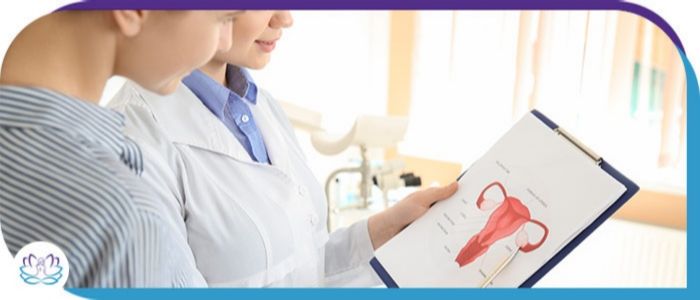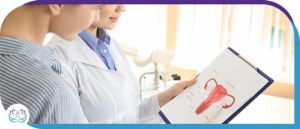Endometriosis Treatment Specialist in Chicago, IL
Finding relief from the symptoms of endometriosis is crucial for improving quality of life and overall well-being. At Dr. Michelle Trandai, MD, OBGYN, we offer comprehensive treatment options tailored to address the individual needs of each patient. Dr. Michelle Trandai, MD, and our experienced team are committed to providing compassionate care and support throughout your treatment journey, helping you manage your symptoms effectively and regain control of your life. For more information, contact us or request an appointment online. We are located at 5449 N. Broadway, Chicago, IL 60640.


Table of Contents:
What is endometriosis?
What are the common signs and symptoms of endometriosis?
What happens after you are diagnosed with endometriosis?
Is endometriosis curable?
Those assigned female at birth can suffer from a range of health conditions that affect their reproductive organs, such as uterine fibroids, polycystic ovary syndrome, and endometriosis.
Endometriosis is a condition in which tissue that is similar to the lining of the uterus develops on the outside of the uterus. This condition can lead to complications such as significant pain and problems with fertility. There are no known definitive causes of endometriosis, but studies have suggested that a potential cause may be retrograde menstruation, which occurs when the menstrual blood flows back into the fallopian tubes and pelvic cavity. Some risk factors have been linked to the development of endometriosis, including hormonal imbalances, having a family history of the condition, immune system problems, starting menstruation at a younger age than average, higher levels of estrogen, and experiencing frequent periods within a shorter cycle.
Several signs and symptoms are caused by endometriosis that will vary a bit from person to person. The most common signs and symptoms include:
– Pelvic pain
– Heavy or irregular bleeding
– Periods that are more painful than average
– Pain experienced during intercourse
– Problems with fertility
Many patients will also report increased bloating, fatigue, and digestive issues that are associated with their endometriosis diagnosis. Most of the associated signs and symptoms lead to discomfort and pain, making it challenging for many individuals to engage in regular daily activities, with their symptoms interfering with their ability to function normally at work, school, or even at home doing simpler tasks. These symptoms can also start to affect the emotional well-being of individuals and interfere with relationships. Having proper coping strategies and receiving proper medical care is very important in making sure that the condition interferes with daily life as much as possible, allowing patients to continue to live fulfilling and comfortable lives.
Endometriosis can cause a variety of symptoms among patients, so the steps following a diagnosis will likely look different from person to person depending on the specific needs and lifestyle of the individual. There are also a variety of triggers or factors that can cause the symptoms of endometriosis to worsen, such as eating certain foods, engaging in physical activity, increased stress levels, and where you are in your menstrual cycle, so one of the first steps following diagnosis will likely include identifying likely triggers for your symptoms and determining what needs to be done to prevent flare-ups. Many patients will choose to keep a symptom diary after they are first diagnosed to help them track patterns and identify potential triggers. A qualified healthcare provider will also be able to help identify likely triggers while providing support in the development of plans to avoid these triggers when possible. This will be a large component of your treatment plan that will be developed between you and your healthcare provider, which will be entirely based on your experienced symptoms, likely triggers, and any other specific needs. Many management plans will include medications to help manage inflammation and pain, hormone therapies to prevent flare-ups, or even surgical procedures for those with more severe symptoms. Management plans will also typically include a variety of lifestyle changes, if applicable, such as strategies to help manage stress, maintaining a healthy, balanced diet, and exercising regularly.
Currently, no cure has been identified for endometriosis, so most treatment options will involve the management of symptoms and preventing flare-ups to improve the level of comfort and quality of life among patients. The most common management tools for endometriosis include medications, hormonal therapies, and lifestyle changes. There are a couple of surgical procedures available for the more severe cases of endometriosis, including a laparoscopy, during which the surgeon will use small incisions and a camera to remove or destroy the endometrial tissue, and a hysterectomy, which is the surgical removal of the uterus. Only in the most severe of cases will a hysterectomy be considered or recommended, resulting in the alleviation of symptoms, but this procedure is not guaranteed to be a cure either, as the endometrial tissue can develop within other areas of the body other than the uterus, including the ovaries or the pelvic cavity. The best course of treatment will be determined by your healthcare provider who will take all your symptoms, preferences, and lifestyle goals into account to provide you with the best quality of life possible.
We provide effective treatment for endometriosis, tailored to your unique circumstances and symptoms. Our compassionate team is dedicated to supporting you throughout your treatment journey, helping you achieve relief and an improved quality of life. For more information, contact us or request an appointment online. We are located at 5449 N. Broadway, Chicago, IL 60640. We serve patients from Chicago IL, Evanston IL, Ravenswood IL, Uptown IL, Lake View IL, Lincoln Park IL, Buena Park IL, Bowmanville IL, Boystown IL, and Roscoe Village, IL.






